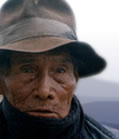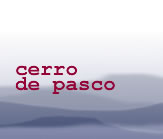THEMES IN THIS
TESTIMONY
Click on arrows
to find more
testimonies
featuring
these themes
|
|
Sex
|
male
|
|
|
Age
|
old
|
|
|
Occupation
|
miner
|
|
|
Location
|
Yauli
|
|
|
Date
|
1995
|
|
summary
Teófilo has combined his life as a comunero (registered community member with rights and responsibilities) with work in the mines for 25 years. His ambition was to become a lawyer but his parents could not afford for him to continue his studies. He begins with a nostalgic recollection of how things used to be in Yauli: when food was plentiful (larders full of meat) and people would come to Yauli from near and far to buy livestock, wool, weavings and even stay to raise animals themselves.
The smelting works at La Oroya changed all that, polluting the land, taking lands away from the comuneros and forcing the campesinos into the mines. He recounts a tale of how a mulateer discovered minerals and sold the land to the mining companies. Mining hasn't altered his personal life too much because he's continued with his communal obligations although he is considering moving elsewhere for the sake of his children and their education. He insists he'll retain his links with the community.
He feels uncomfortable working for the company that has destroyed their lands but had little choice. He acknowledges some of the benefits the mining company has brought them eg electricity, but now the mines are laying off workers and it’s time for the community to find alternative ways to survive: thermal baths, a mineral water industry, trout farms, livestock etc.
He talks of the health effects of the polluted water - the municipality are trying to do something about improving the water. The community (and ones nearby) have come together to demand compensation for their degraded land. The amounts proposed are not enough to divide up between comuneros, not even to cover the costs of the medicine to cure their sick animals. Rather than compensation, what is needed is research into how to rejuvenate the lands - the municipality is looking into pollution-resistant trees for example. They also need help for improving their livestock.
He talks wisely of the economy in decline. Gone are the days of wool, craft and meat production. A recent alpaca-raising scheme failed because all the animals died. They need investment in tools, tractors, seeds, machinery etc. Yauli has contributed so much to the local economy, but is now in the shadow of La Oroya. It is time it was recognised and repaid.
detailed breakdown
|
You will need a password from Panos to view the full
transcript of the interview. To apply for a password, click here.
Once you have a password, click here to go to the beginning
of the transcript. You can also click on any section of the
breakdown of content below and go straight to the
corresponding part of the transcript.
|
| Section 1 |
Recounts family history – grandparents were comuneros and therefore he is. Laments decline of livestock in Yauli - caused by pollution and high costs of medicine etc. Before people had more resources, now families merely get by.
|
| Section 2 |
Talks about the economic dilemma thrust on him and so many of his community - unable to afford the cost of going to university. He is a miner but keeps up his communal responsibilities and keeps some livestock.
People have to engage in a range of economic activities to survive.
Begins to talk about people leaving the area.
|
| Section 3-4 |
Main activity of Yauli comuneros is mining, people only rear a few livestock.
Decline of Yauli as La Oroya becomes the administrative (and industrial) centre; recollection of “golden era” of Yauli, when people would come from other countries to live here for the livestock and the mining.
The fumes from the smelter at La Oroya have damaged everything. Have protested about their situation but no-one has listened to them.
Migration - those who go forget about what they leave behind; most only come back to visit. Dilemma with his children - he wants to stay in the community, but wants the best for his children too so might have to move elsewhere
|
| Section 5 |
Education – importance of this but there is no place for further education here. There is also a need for training and technical support to regenerate the land and the local economy.
|
| Section 6 |
Description of work in mines – he has been a miner for 25 years.
History of mines - tale of local mulateer who got rich when he discovered minerals.
History of legal problems with mining company – pollution and deceit.
|
| Section 7 |
Have to work in the mines for the family to survive. One of the benefits of people working in the mines has been the community getting electricity. Now the mining company have reduced the workforce and people must look for alternative ways to make a living. Ideas so far are livestock breeding, trout farm, mineral water plant etc.
Pollution is getting worse and the reduced workforce has less power. People have problems with their teeth because of lime in water.
|
| Section 8 |
Recollection of days of CdePC – they used to have many livestock Gradual deterioration of pasture. Smelters emit less fumes now than they did before but the damage has already been done.
|
| Section 9 |
Need for economic and technical support. They have worked with another community and planted some trees. But there is a need for investment in regenerating soil and livestock; lack of medicine available for animals. Catch 22: they need more animals but can’t afford the medicines to cure and maintain them.
Description of how the community is organised.
|
| Section 10 |
Describes different diseases livestock suffer as a result of contaminated water, pasture and air.
Role of cooperative - good idea but not actually yielding much reward.
Fiestas (festivals, celebrations) – “there are lots of people who’ve emigrated to other places and almost forgotten about these fiestas.”
|
| Section 11 |
Memories of artisanal fair which still occurs.
Hopes for development of livestock - need for investment in hardy camelid (llamas) group rather than sheep and cows; disastrous attempt to rear alpacas; reiterates need for investment in tractors, seeds, technical support etc.
|
| Section 12 |
Changing economic landscape of Yauli: from being a centre of farming, trade and commerce, it has lost out to La Oroya developed by the gringos (North Americans who ran/owned the mines).
|
| Section 13 |
Brief discussion of the history of Yauli - tales of mines and livestock. |
|


